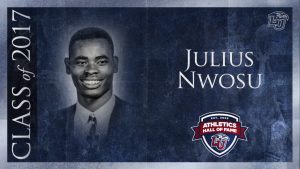Julius Nwosu took a very interesting path to the NBA. He was born in Nigeria, then attended college at Liberty, where he averaged 14.3 PPG/7.4 RPG while shooting 56.2 FG%. He did not get drafted but was signed by San Antonio in 1994 and joined a fantastic frontcourt that included future Hall of Famers Moses Malone/David Robinson/Dennis Rodman. He continued to play basketball around the globe, ending up in 14 different countries during his 14-year pro career. HoopsHD’s Jon Teitel got to chat with Julius about growing up in Nigeria and playing in the NBA. Today is his 50th birthday so let us be the 1st to wish him a happy 1!
You were born/raised in Nigeria: how did you 1st get into basketball, and why did you decide to go to Liberty? I played volleyball/handball/soccer growing up but then I started getting taller than all of my teammates. We would watch Hakeem Olajuwon’s games on TV. Everyone else was pushing me to get into basketball when I was about 15-16. I am a Christian and attended a Baptist church: we had a missionary every summer from Florida and the guy asked me if I wanted to play in the US at a Christian university.
You were named All-Conference as a junior and senior: did you feel like you were 1 of the best players in the conference? I think so: I was 1 of the dominant centers in the Big South at the time.
In 1993 you tied a Big South tourney record with 18 REB and made 9-10 FG in a 4-PT loss to Radford: was it just 1 of those scenarios where every shot you put up seemed to go in because you were “in the zone”? It was 1 of those big rivalry games and I was ready to go right out of the gate.
You also finished 2nd in the conference in shooting as a senior (61.5 FG%): what is you secret for being a great shooter? I was not that good of a shooter from outside as a freshman but I worked on my shot during the summertime. I wanted to shoot from 3-PT land as a senior but the coach would not let me!
In 1994 you signed as a free agent and played 23 games for the Spurs: what is your favorite memory from your time in the NBA? 1 time I was voted as Player of the Week off the bench and my teammates were all happy for me.
Your team made it to the Western Conference Finals that season: what is the biggest difference between the regular season vs. the postseason? I was just a rookie with a lot of veteran players who played hard, but when you get to the playoffs you try to leave everything on the floor. If you have a broken finger during the regular season you would let it heal, but in the playoffs you just wrap it up and try to go as far as you can.
You played for the Nigerian national team at the 1998 FIBA World Championship, but due to bad medication bought at a market in Lagos you were suspended for doping and could not finish the tournament: how did you feel when you learned about your suspension, and what impact did it have on your reputation (if any)? We spent a month in the capital of Nigeria prior to the FIBA games and I got malaria and was very sick. I took some medicine (including Nyquil) the night before the game hoping that I would wake up refreshed. I have never had a drink or a smoke so drug testing was never a problem for me when I was playing professionally. I did not list Nyquil on the list of medications that I was taking because I did not even think it was illegal. I tried to play the next season but every team I talked to told my agent that they were concerned about my failed test, so I ended up having to go to Russia and played for a team that never paid me.
You played in 14 different countries during your 14-year pro career: what did you learn from these experiences, and how did they compare to the NBA? It was amazing to play overseas. When I 1st came out of school and played in Spain there was a huge gap between Europe and the US, but nowadays most of the pro teams abroad could blow out any US college team. The system in Europe is about playing as a team and moving the ball, whereas the NBA is about individual talent. When I watch college basketball I see so many guys doing things the wrong way due to flaws in the system.
You later became a coach in Texas: how did you like the job, and what do you hope to do in the future? I would like to coach college basketball. Due to all of my experience I think that I could make a difference. For example, when you are playing defense on the post you cannot front your opponent all the time because he will push you outside and then have the ball dumped inside to him, but it seems like a lot of college players do exactly that. Most mid-level NCAA coaches end up borrowing a system from a high-level coach and then their assistants just learn their own coach’s system.
When people look back on your career, how do you want to be remembered the most? I was a guy who liked to play defense so when I look back I wonder if I should have tried to score more often. I am probably the only player who has won 15 championships because I have played in so many different places and was willing to do whatever it took to win. I was relentless on the court and worked very hard.



